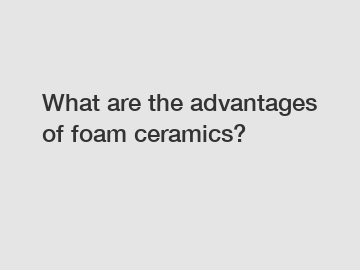What are the advantages of foam ceramics?
Foam ceramics, also known as cellular ceramics, have been gaining popularity in various industries for their unique properties and advantages. These lightweight and porous materials have a wide range of applications, from thermal insulation to structural components. In this blog, we will explore the advantages of foam ceramics and why they are a preferred choice for many manufacturers.
One of the main advantages of foam ceramics is their lightweight nature. These materials are made up of tiny air bubbles dispersed throughout a ceramic matrix, providing a high strength-to-weight ratio. This makes foam ceramics ideal for applications where weight is a concern, such as in aerospace and automotive industries. The lightweight nature of foam ceramics also makes them easy to handle and transport, reducing logistical costs for manufacturers.
Another key advantage of foam ceramics is their thermal insulation properties. The porous structure of foam ceramics acts as a barrier to heat transfer, making them excellent insulators. This makes foam ceramics ideal for use in high-temperature environments, such as in ovens, kilns, and furnaces. The thermal insulation properties of foam ceramics also make them an ideal choice for use in building materials, helping to reduce energy costs and increase efficiency.

In addition to their thermal insulation properties, foam ceramics are also known for their high temperature resistance. These materials can withstand extreme temperatures without losing their structural integrity, making them ideal for use in applications where heat resistance is essential. This high temperature resistance makes foam ceramics ideal for use in industrial applications, such as in the production of molten metal or glass.
Foam ceramics also offer excellent chemical resistance, making them suitable for use in harsh environments where exposure to corrosive substances is a concern. The ceramic matrix of foam ceramics is inert to most chemicals, making them a durable and long-lasting material choice. This chemical resistance makes foam ceramics ideal for use in chemical processing plants, wastewater treatment facilities, and other applications where exposure to corrosive substances is a concern.
Another advantage of foam ceramics is their versatility. These materials can be easily shaped and molded into various forms, allowing for customized solutions to fit specific application requirements. Whether it's a complex shape for a structural component or a simple form for thermal insulation, foam ceramics can be tailored to meet the needs of almost any application. This versatility makes foam ceramics a popular choice for designers and engineers looking for innovative solutions to their material challenges.
Foam ceramics also offer excellent mechanical properties, such as high compressive strength and stiffness. This makes them suitable for use in structural applications where strength and durability are essential. The cellular structure of foam ceramics provides a high degree of rigidity, making them ideal for use in load-bearing applications. This high mechanical strength makes foam ceramics a versatile material choice for a wide range of applications, from automotive components to building materials.
In conclusion, foam ceramics offer a wide range of advantages that make them a preferred choice for many manufacturers. Their lightweight nature, thermal insulation properties, high temperature resistance, chemical resistance, versatility, and mechanical properties make them an ideal material choice for a variety of applications. Whether it's for thermal insulation, structural components, or chemical processing, foam ceramics provide a unique set of advantages that make them a valuable material choice for today's engineering challenges.
If you want to learn more, please visit our website molten metal filter, Ceramic Foam Filter for Foundry Applications, fiberglass filter for steel.
128
0
0


Comments
All Comments (0)